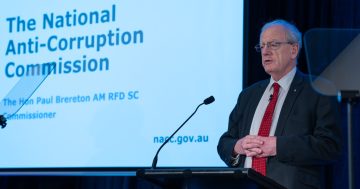
Senior public servant Kathryn Campbell, on leave from the APS since the Royal Commission into Robodebt handed down its report. Photo: File.
Senior public servants past and present who pushed the rollout of the illegal Robodebt scheme are bracing for the worst, with the Royal Commission into the saga naming some of them in the same sentence as the word ‘prosecution’.
They know who they are, as does the Australian Public Service Commission, which is ensuring agency heads refer names for a public service investigation headed by former APS commissioner Stephen Sedgwick.
But Royal Commissioner Catherine Holmes has controversially publicly suppressed the names of those she recommends should be pursued for civil or criminal prosecution.
The APSC, the Attorney-General’s Department, the Department of Prime Minister and Cabinet, along with the Australian Federal Police, the National Anti-Corruption Commission and the ACT Law Society were all sent the sealed section of the Royal Commission’s final report.
This has led to mounting speculation and high tension over who has been named on the explosive list.
Much talk has centred on the Coalition ministers involved in the creation and implementation of the automated debt recovery program – including former prime minister Scott Morrison and former ministers Alan Tudge, Stuart Robert and Christian Porter.
But there are plenty of APS types who are justifiably nervous about their own futures.
Government lawyers are among them for how they advised or otherwise about the legalities of the scheme.
Former departmental secretary Kathryn Campbell, often referred to as the face of Robodebt, has attracted the most attention.
She is currently on ‘gardening duties’ from the $900,000 a year special AUKUS advisory job Labor sidelined her to after winning last year’s election.
She began the leave the day before the Royal Commission’s report was delivered to Governor-General David Hurley.
That report was highly critical of her behaviour in ignoring the illegalities of the scheme in order to please her political masters.
It accuses her of misleading cabinet in order to save herself embarrassment.
“Yeah, the Commission didn’t miss her in terms of their analysis,” Government Services Minister Bill Shorten told ABC Radio in answer to questions about whether Ms Campbell should stay in her government role.
“At this stage, I’m not commenting about individuals who may or may not have had adverse findings against them because I don’t want to get in [the] way, so to speak, of the process.
“As a general principle, I think that if you were highly involved in this scheme and you have an adverse finding, I think that becomes difficult for the government. But I can’t talk about individuals.”
On the ABC’s 7:30 program, the Minister went further about how the architects and orchestrators of Robodebt behaved and how they should be treated.
“This was a war on people on welfare. There was a trope, a proposition, a stereotype which said that there was a mountain of gold, that these ungrateful people, being treated as second-class Australians, were ripping off the system,” he said.
“And the Morrison and the Turnbull governments were going to go to war and get it all back for the taxpayers.
“So, it was a poor shaming, welfare attacking, vicious attack and it was illegal. It was unlawful from the get-go.
“And for four and a half cruel years the previous government shouted down, intimidated and ignored all of the red flags, the hurt, the harm, the firehose of complaint and grief…
“The sealed section has referred a range of public servants and some politicians to various regulatory agencies… and the facts of the matter do not reflect well on government, do not reflect well on some public servants or some ministers in the previous government…
“I do think at the end of the day that the citizens of this country have a right to see what happens, but we’ve got to make sure we get the processes right, which is what the Royal Commission spelt out…
“This Royal Commission outlines in tragic honesty the culpability of a range of Coalition ministers and senior public servants.
“There’s no escaping that. And if these characters think that somehow they’re in the clear, I don’t read that when I read this Royal Commission.”
Original Article published by Chris Johnson on Riotact.









